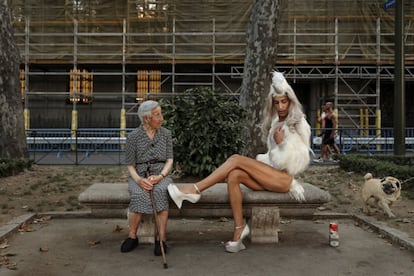The city that won’t let me sleep
Residents from all over Europe are organizing in a bid to fight nighttime noise pollution

Noise levels that prevent sleep can be torture. The World Health Organization says not getting our eight hours can lead to “mental and cardiovascular” disorders, both immediate and in the long term, while some legal experts say it is it an attack on our fundamental rights. It can also mean making our way to work through a landscape of drunk stragglers, leftovers from street parties and litter.
Sound familiar? It’s a scene described by Esteban Benito, a resident of Madrid’s Chueca neighborhood; Luis Paisana, from Bairro Alto in Lisbon; Jean-François Révah, from the XI district in Paris; and Simonetta Chierici, who lives close to the Vittorio square in the center of Turin…
They are all members of neighborhood associations in 45 European cities (the majority French and Italian) who have joined together to protest “out of control and unregulated nightlife.” They say that the problem has grown since anti-smoking laws were passed a decade ago – although they are careful not to blame the regulations for the problem, but rather the unwillingness of the authorities to do anything about the nuisance caused by smokers who indulge their habit on the street, outside the nightspot they are frequenting.
This is a symptom of an economy that profits a sector offering short-term benefits Luis Paisana, from Bairro Alto
“It would be perverse to criticize actions that protect people’s health,” explains Parisian Jean-François Révah, one of the main proponents of the neighborhood initiative, which is considering lobbying the European Commission lobby to introduce regulations to protect residents, such as stricter measures and higher fines for businesses that cause noise, as well as limiting the expansion of terraces and providing support for traditional businesses that are being squeezed out of city centers.
They face an uphill struggle. And not just because theirs is a dispersed movement with scant resources up against the clout of the nightlife sector, but also because other city dwellers have a more positive vision of the same neighborhoods, and value nightlife, accusing the campaigners of being little more than reactionary spoilsports.
“Obviously I want my neighborhood to be clean and somewhere I can enjoy peace and quiet, but I understand that I live in an area where culture, nightlife and livability have to be balanced. I believe that we have to be tolerant about noise levels, as well as toward other uncomfortable aspects of living in an active urban center,” explains Luna Martín, a 36-year-old publicist and Chueca resident.

There is more than just sleepless nights at stake, say the campaigners. “I believe that it is really a symptom of an economic model that profits a sector offering short-term benefits, and that will not last, but will change Lisbon forever,” says Luis Paisana, from Bairro Alto. He’s talking about the ongoing gentrification of neighborhoods in the city that are focused solely on nightlife. “In times of austerity, a lot of cities are trying to promote themselves as tourism and nightlife destinations,” explains Paul Chatterton, a geographer from Leeds University. “This is making day-to-day life more difficult for residents [due to high prices, a lack of grocery shops], in particular in popular cities such as Barcelona, Prague, Paris, London, etc.,”
“I have a right to live here, it’s a residential zone,” argues Esteban Benito. “And my privacy and well-being should be respected.” His house is very close to the Plaza de Chueca, a world-famous square for its nightlife and for being the host of one of Europe’s best-known Gay Pride celebrations.
European residents complain that the authorities turn a blind eye to tourism events
It was after the 2007 event in Madrid that Esteban began to search the internet for a residents association he could join. Many other people did the same that year. “It was unbelievable,” he explains. “People come here and think that anything goes, that there are no rules, that they can do anything in the street: shout, sleep, piss, fuck… I am no killjoy, but there are people living here…”
Madrid City Hall recently declared the Gay Pride celebrations as having “special importance for citizens,” which gives the event exemption from complying with noise limits, for which it had been systematically fined in recent years.
European residents complain that too often city authorities turn a blind eye to events that bring in visitors. They add that the sector is “unable to self-regulate,” and that “dialogue is impossible with the businesses who cause problems,” according to the manifesto put together by the associations that have got together in Paris under the name Réseau Européen Vivre la Vill! (European network Live the City).
“We promote establishing a seal of acoustic quality and we organize awareness campaigns,” explains Joaquim Boadas, the general secretary of the International Nightlife Association, which brings together nightlife businesses from all over the world, and its national version, Spain Nightlife. “Years ago we signed a protocol with the Catalan Association of Acoustic Contamination (ACCCA) that facilitates extrajudicial agreements between residents and businesses with measurements carried out by councils and acoustic technicians.”
No one is against people having fun, but it cannot affect health and rest
Activist Simonetta Chierici
However, Luis Gallardo, from the ACCCA, explains that the impact of this protocol has been minimal (six or seven agreements and the same number of Catalan councils who have signed up in nearly 10 years), and has served basically for “cordial relations” between businesses and residents.
In general, experts talk about the need to share uses – residents are needed, otherwise these neighborhoods would be little more than theme parks; as is nightlife, without which they would be a “sterile, dead” space, according to Luc Gwiazdzinski, a geography lecturer from the University of Grenoble-Alps.
The problem, as always, is that the battle is usually unequal and the result is not always the fair one. As such, residents’ associations are beginning to get organized to be ready for a heated debate. Lluis Gallardo points out that it was the local business community that applied pressure to end legislatoin in Catalonia that made nightspots responsible for noise levels outside their establishments.
“No one is against people having fun, but it must be responsible and it cannot affect rights when it comes to health and to rest,” argues Simonetta Chierici, the president of the coordinator that brings together associations from different Italian cities to protect their neighborhoods.
English version by Simon Hunter.
Tu suscripción se está usando en otro dispositivo
¿Quieres añadir otro usuario a tu suscripción?
Si continúas leyendo en este dispositivo, no se podrá leer en el otro.
FlechaTu suscripción se está usando en otro dispositivo y solo puedes acceder a EL PAÍS desde un dispositivo a la vez.
Si quieres compartir tu cuenta, cambia tu suscripción a la modalidad Premium, así podrás añadir otro usuario. Cada uno accederá con su propia cuenta de email, lo que os permitirá personalizar vuestra experiencia en EL PAÍS.
¿Tienes una suscripción de empresa? Accede aquí para contratar más cuentas.
En el caso de no saber quién está usando tu cuenta, te recomendamos cambiar tu contraseña aquí.
Si decides continuar compartiendo tu cuenta, este mensaje se mostrará en tu dispositivo y en el de la otra persona que está usando tu cuenta de forma indefinida, afectando a tu experiencia de lectura. Puedes consultar aquí los términos y condiciones de la suscripción digital.









































